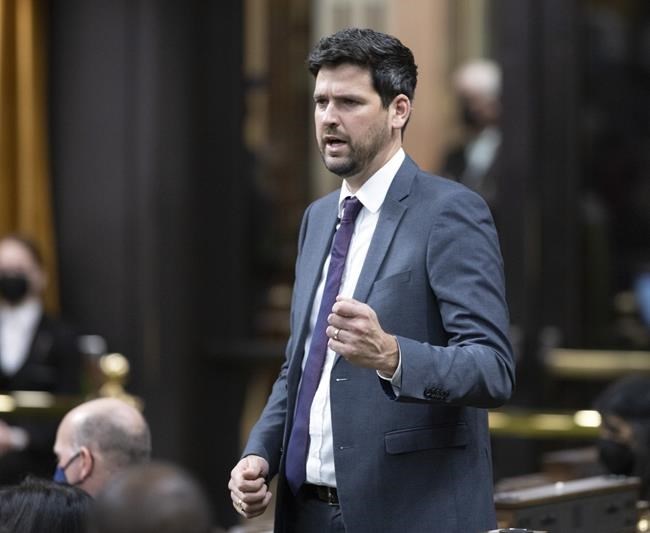
Immigration Minister Sean Fraser rises during Question Period, in Ottawa, Friday, Dec. 10, 2021. THE CANADIAN PRESS/Fred Chartrand
Republished January 31, 2022 - 2:12 PM
Original Publication Date January 31, 2022 - 8:46 AM
OTTAWA - Immigration Minister Sean Fraser says the government will get back on track by the end of the year after COVID-19 caused a major backlog in the processing of immigration applications and long waits for people seeking status in Canada.
The government last year announced it would spend $85 million to plow through the backlogged applications, which Fraser says will be used mainly to hire more staff.
The additional immigration workers will help the government get back on top of its established turnaround times for study and work permits, permanent resident renewals, visitor visas and proof of citizenship applications.
Notably absent from the list is family unification applications, Fraser said, because they already meet the standard one-year target for processing.
"I should point out that these will not solve all of the problems with Canada's immigration capacity overnight, but they will start to make a difference. And some will start to make a difference very quickly," Fraser said in an interview Sunday.
He expects that the government will clear the backlog of permanent resident applications by the end of the year, as well as begin to process new applications more quickly moving forward.
The minister also promised to post more accurate processing times on the government's website so people have a true idea of how long their application will take.
It's not yet clear when those estimates will be available online.
The new staff will hopefully be able to ease the short-term stress on Canada's immigration system and its applicants while the government makes more permanent changes, Fraser said.
The government will expand a pilot project that allowed 10 to 20 per cent of permanent resident applicants to file digitally. As soon as this summer, all permanent resident applications will be directed to the digital intake, eliminating paper forms except for those who still need them.
"This tool also provides a confirmation that your application has been submitted, so you have something you can rely on," Fraser said of the more modern system. "It's going to make a big difference."
The government will also roll out an application tracking tool in February for spouses, partners and dependants to check their status of their claim in real time, "which is a very difficult thing to access under the paper-based system," he said.
Fraser said the government also hopes to expand virtual citizenship ceremonies and introduce an electronic oath of citizenship so people aren't stuck in limbo between getting approved and actually becoming a Canadian citizen.
No decision has been made about whether virtual ceremonies and electronic oaths will be instated as a temporary measure during the pandemic or as a permanent fixture on the path to Canadian citizenship.
Right now there are roughly 60,000 people approved for citizenship waiting for a ceremony, the minister said.
"We will be having conversations to ensure that we administer the system in a way that improves efficiency, but at the same time doesn't deny those people who want to take part in a formal ceremony and be welcomed into the Canadian family in that traditional way," he said.
Jenny Kwan, NDP immigration critic, said while she is glad to hear the government is finally taking action to address the immigration backlog, these problems have existed for a very long time.
In an interview, she noted that Fraser excluded the need to address family reunification with respect to the backlogs.
"The significant delay in processing for family reunification is very real," said Kwan, citing her experience talking with constituents and people in her role as immigration critic.
The minister needs to create service standards for all industries and not only some, she said, adding that applicants in the caregiver stream do not receive timelines for processing their application.
"People's lives are being put on hold and being impacted. And for them to access this basic information would absolutely be essential," said Kwan.
Jasraj Singh Hallan, Conservative immigration critic, said in a statement that the Liberal government has failed to take serious action to remedy the backlog or improve transparency and credibility.
"It is unacceptable that there are 1.8 million applications in limbo to date. Liberal mismanagement continues to fail the immigration system by overpromising and underdelivering," said Hallan.
The Tories are calling on the minister to implement recommendations made by the House citizenship and immigration committee and provide a clear plan to address how they will clear the historic application backlog, he said.
This report by The Canadian Press was first published Jan. 31, 2022.
— With files from Erika Ibrahim
Note to readers: This is a corrected story. A previous version incorrectly stated there are 600,000 people approved for citizenship waiting for a ceremony.
News from © The Canadian Press, 2022